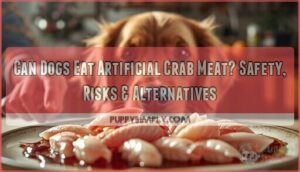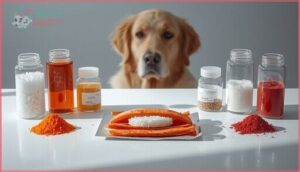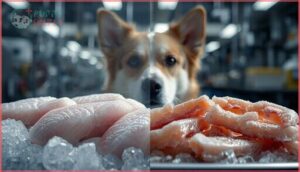This site is supported by our readers. We may earn a commission, at no cost to you, if you purchase through links.
Your dog just snagged a piece of imitation crab from your sushi platter, and now you’re wondering if you need to panic. The short answer: while artificial crab meat won’t poison your pup, it’s far from an ideal snack.
This processed seafood substitute, made primarily from white fish paste called surimi, packs a concerning amount of sodium and artificial additives that can wreak havoc on your dog’s digestive system and overall health. What seems like a harmless protein treat contains starches, preservatives, and flavor enhancers designed for human taste buds, not canine nutrition.
Before you share your next seafood feast with your four-legged friend, understanding what’s hiding in that pink-and-white stick can help you make smarter choices about treats that won’t compromise their well-being.
Table Of Contents
- Key Takeaways
- Can Dogs Eat Artificial Crab Meat?
- What is Artificial Crab Meat Made Of?
- Health Risks of Feeding Dogs Imitation Crab
- Nutritional Value Compared to Real Crab
- Safe Ways to Offer Seafood to Dogs
- Frequently Asked Questions (FAQs)
- Can I give imitation crab meat to my dog?
- Can dogs eat imitation meat?
- Can my dog eat canned crab meat?
- Can dogs eat imitation crab meat sticks?
- Can dogs eat imitation crab?
- Can dogs eat crab meat?
- Can dogs eat crab sticks?
- Can dogs get sick if they eat crabs?
- Can dogs eat crab salad?
- Is it okay for dogs to eat imitation crab meat?
- Conclusion
Key Takeaways
- Imitation crab is not toxic to dogs, but its high sodium content (450-715 mg per 3 oz), artificial additives, and heavy processing make it a poor nutritional choice that can strain your dog’s heart and kidneys over time.
- Real crab delivers roughly double the protein and essential nutrients like vitamin B12, zinc, and omega-3 fatty acids compared to imitation crab, which relies on starches and sugars that offer minimal canine health benefits.
- If your dog accidentally eats a small bite of imitation crab, they will likely be fine, but regular consumption increases risks of digestive upset, food allergies, and sodium-related complications like electrolyte imbalance.
- Safe seafood alternatives for dogs include plain cooked salmon, cod, sardines, and real crab meat (without shells or seasoning), served in small portions that do not exceed 10% of their daily calorie intake.
Can Dogs Eat Artificial Crab Meat?
Artificial crab meat isn’t toxic to dogs, but that doesn’t mean it’s a good choice for your furry friend. While a small bite probably won’t cause an emergency, the high sodium content and artificial additives can lead to problems if your dog eats it regularly.
If you’re worried about what happens when dogs consume seafood scraps, check out the risks of feeding your dog crab shells and similar hazards.
Let’s break down what veterinarians actually recommend regarding feeding imitation crab to dogs.
Is Imitation Crab Meat Safe for Dogs?
Imitation crab isn’t toxic to your dog, but it’s generally unsafe because of heavy processing and additives that don’t suit canine nutrition. Most veterinary and pet nutrition advice frames it as “not appropriate,” even though a tiny accidental taste rarely causes serious harm in healthy dogs.
Key safety points about imitation crab and dog health:
- Not formulated for dogs: Surimi products are designed for human taste, not canine digestion or nutritional needs
- Heavy processing removes benefits: Manufacturing strips natural fats and nutrients from the original fish base
- Multiple allergen risks: Contains fish, egg whites, and wheat starch that can trigger sensitivities
- High sodium danger: Three ounces pack 450-715 mg of salt, stressing your dog’s heart and kidneys
- Better seafood alternatives exist: Plain cooked fish or real crab offers safer, more natural options
If your dog shows signs of gastrointestinal upset or allergic reaction after eating imitation crab, consult your veterinarian promptly.
Occasional Vs. Regular Consumption
A one-time nibble of imitation crab rarely harms healthy dogs, but regular consumption increases risks you can easily avoid.
Feeding guidelines suggest all treats stay under 10 percent of daily calories to maintain nutrient balance, and imitation crab’s high sodium intake—around 520 mg per half-cup serving—can strain your dog’s digestive health and kidneys when offered repeatedly.
Seafood and dogs mix better with occasional plain fish rather than processed options.
Veterinary Perspectives on Artificial Crab for Dogs
Veterinary guidance from pet nutrition experts aligns on discouraging imitation crab as a regular dog food, citing three main concerns:
- High sodium levels that worsen canine health risks like kidney disease and heart problems
- Processed additives and starches that offer minimal nutritional value and may trigger dog allergies
- Better seafood alternatives like plain cooked fish that provide complete protein without unnecessary fillers
As a reminder, can pose additional risks to dogs due to potential parasites and choking hazards. Your veterinarian can recommend safer options customized to your dog’s specific nutrition needs.
Some human beverages can also pose problems—understanding what dogs can safely drink helps you avoid accidental health issues.
What is Artificial Crab Meat Made Of?
Before you decide whether to share that California roll with your dog, it’s worth understanding what’s actually in imitation crab meat. This processed seafood product is made from a mix of fish and additives designed to mimic real crab, but the ingredients can affect your dog’s health in ways you might not expect.
Let’s break down what goes into artificial crab and why the recipe matters for your pup.
Main Ingredients in Imitation Crab (surimi)
When you peek at the label of imitation crab, you’ll find it’s built on surimi—a fish paste made mainly from Alaska pollock or similar white fish. This minced fish base makes up roughly 55 percent of the product’s weight, providing the protein foundation.
Manufacturers also blend in starches like wheat or potato to help the paste hold its shape, plus sugar and egg whites to improve texture and firmness.
Additives, Preservatives, and Flavorings
Beyond the surimi base, manufacturers rely on a long roster of additives to make imitation crab shelf-stable and visually convincing.
Sodium levels spike from table salt and sodium-based preservatives, often pushing a single serving above 500 milligrams. Artificial flavors mimic real crab taste, while synthetic dyes add that recognizable orange-red hue.
Some brands also sneak in sugar or sorbitol, which serve as flavor enhancers but offer zero nutritional upside for your dog.
How Processing Affects Dog Health
Processing risks escalate when manufacturers grind, heat, and chemically treat white fish to create imitation crab, transforming a whole food into something your dog’s digestive system wasn’t designed to handle. The dense, rubbery texture can slow stomach emptying and trigger digestive issues, while repeated heating denatures proteins in ways that worsen food allergies in dogs.
Even more concerning, carb fillers displace the lean protein canine dietary needs demand, leaving nutrient deficits that undermine pet food safety standards and overall dog health and nutrition.
Health Risks of Feeding Dogs Imitation Crab
While imitation crab isn’t toxic to dogs, it comes with several health concerns that make it a poor choice for regular feeding. The heavily processed ingredients, high sodium levels, and various additives can create problems for your dog’s body, especially if consumed frequently or in large amounts.
Let’s look at the three main health risks you should know about before sharing this seafood substitute with your pup.
High Sodium Content and Potential Complications
One small serving of imitation crab delivers 400 to 700 milligrams of Sodium Toxicity, a serious load for any dog. That’s not just table salt—it’s brines, flavorings, and preservatives packed into every bite.
High sodium intake can trigger Sodium Toxicity, spiking your dog’s thirst and causing vomiting, diarrhea, or Electrolyte Imbalance within hours. Over time, it strains the heart, raises Blood Pressure, and burdens the kidneys, risking long-term Organ Damage and Kidney Strain.
High sodium in imitation crab can poison dogs quickly and damage their heart and kidneys over time
Allergic Reactions and Sensitivities
Food Allergies can strike hard when imitation crab contains fish like pollock, wheat starch, egg white, or soy protein—common triggers for Food Sensitivities in dogs. You might see Skin Reactions like itching, ear infections, or red belly patches, plus Gastro Issues such as vomiting and diarrhea.
In rare cases, facial swelling or breathing trouble signals Anaphylaxis Signs, a true Dog Health Concerns emergency. Sensitivity Testing helps pinpoint Food Intolerance before Allergic Reactions escalate.
Digestive Issues and Upset Stomach
High salt and artificial ingredients in imitation crab can trigger Gut Irritation, drawing water into your dog’s intestines and causing rapid Stomach Upset.
Starches, preservatives, and histamine from processed fish irritate the gut lining, leading to vomiting, diarrhea, and bloating—classic signs of Digestive Upset.
These Intestinal Issues compromise Digestive Health over time, weakening nutrient absorption and increasing sensitivity to future Food Allergies, which makes Dog Dietary Safety critical.
Nutritional Value Compared to Real Crab
When you compare imitation crab to the real thing, the nutritional gap becomes pretty obvious—and that matters for your dog’s health.
Real crab delivers high-quality protein and essential nutrients that support canine wellness, while artificial versions fall short in ways that go beyond just taste. Let’s break down the key differences so you can make informed choices about what ends up in your pup’s bowl.
Protein and Calorie Differences
Real crab delivers roughly double the protein per serving compared to imitation crab, which means your dog gets far more usable protein in every bite.
While a 3-ounce portion of real crab can provide 16 to 20 grams of protein to support muscle repair and energy, the same amount of imitation crab offers only 6 to 8 grams. That’s a significant difference in protein density and overall nutrient balance for canine nutrition.
Lack of Essential Nutrients for Dogs
Beyond just low protein, imitation crab fails to deliver the essential vitamins, minerals, and amino acids your dog needs. Real crab naturally provides vitamin B12, zinc, and selenium, while imitation versions replace these with starches and sugars that create texture but offer little nutritional value. Over time, this can lead to nutrient deficiencies and dietary gaps that compromise canine nutrition.
- Dogs require ten essential amino acids for muscle repair and immune health, which imitation crab doesn’t reliably provide
- Trace minerals like zinc, copper, and manganese support skin and metabolism but aren’t meaningfully present in processed surimi
- Omega-3 fatty acids vital for coat health and inflammation control are far weaker in imitation crab than real seafood
Better Seafood Alternatives for Canine Diets
When you want to share seafood nutrition with your dog, skip the imitation and reach for real options that support canine wellness. Plain cooked salmon, cod, whitefish, and sardines deliver fish oil benefits without additives, while shelled shrimp and real crab make healthy treats in moderation.
These safe seafood options for canine consumption fit balanced diets and homemade dog food recipes far better than processed surimi.
| Seafood Type | Key Benefits |
|---|---|
| Salmon, sardines, cod | Rich omega-3s, lean protein, low mercury |
| Real crab, shrimp | Vitamin B12, zinc, selenium when plain-cooked |
| Whole small fish | Complete nutrients, skin health, natural chew option |
Safe Ways to Offer Seafood to Dogs
If you want to share seafood with your dog, real options exist that won’t compromise their health the way imitation crab can.
The key is choosing the right types of fish and shellfish, preparing them safely, and knowing how much to offer. Let’s look at which seafood makes the grade, how to serve it properly, and when it’s time to check in with your vet.
Recommended Seafood Options and Preparation Tips
If you’re looking to add seafood to your dog’s menu, stick with plain cooked options that deliver real dog nutrition benefits.
Here are the top healthy alternatives to imitation crab:
- Salmon – Bake or steam boneless fillets for omega-3s that support coat health
- Cod and pollock – Mild white fish offering lean protein without heavy seasoning
- Sardines – Small, low-mercury fish packed in water, not oil
- Plain shrimp – Fully cooked, deshelled, and served without butter
- Real crab meat – Remove all shells and skip the seasoning for canine wellness
Portion Control and Frequency
Now that you know which seafood works best, portion control for dog treats becomes your next priority. Treats, including any seafood, shouldn’t exceed 10 percent of your dog’s daily intake limits—so if your pup eats 600 calories daily, cap all treats at 60 calories combined.
Here’s a quick feeding guidelines breakdown:
| Dog Size | Max Seafood Portion |
|---|---|
| Small (under 20 lbs) | 1-2 teaspoons |
| Medium (20-50 lbs) | 2-3 teaspoons |
| Large (over 50 lbs) | 1-2 tablespoons |
Limit seafood treats to once or twice weekly for safe human foods for dogs and proper calorie monitoring.
When to Consult Your Veterinarian
Certain situations call for immediate veterinary advice rather than waiting to see if symptoms resolve on their own. Emergency symptoms like facial swelling, hives, or breathing trouble after any seafood exposure need urgent veterinary consultation, as shellfish proteins can trigger severe allergy signs even from processed foods.
Contact your veterinarian if your dog shows:
- Repeated vomiting or diarrhea lasting over 24 hours
- Signs of sodium poisoning—tremors, disorientation, or excessive thirst
- Known kidney, heart, or pancreas conditions before trying new foods
- Persistent digestive issues or skin reactions after seafood treats
Proactive vet consultations protect your dog’s long-term animal health and wellness.
Frequently Asked Questions (FAQs)
Can I give imitation crab meat to my dog?
You can technically give your dog a tiny bite, but here’s the twist: just because something won’t poison them doesn’t mean it’s actually good for them—and imitation crab isn’t.
Can dogs eat imitation meat?
Imitation meat products depend entirely on their ingredients—some plant-based options contain onion, garlic, or excess sodium that pose canine health risks.
Always check labels carefully and consult your veterinarian before introducing any processed meat alternatives.
Can my dog eat canned crab meat?
Most canned crab products pack around 300-500mg of sodium per serving, which is risky for dogs with heart or kidney issues.
Plain, unseasoned varieties are safer, but rinse thoroughly and offer only tiny portions infrequently.
Can dogs eat imitation crab meat sticks?
Dogs can eat imitation crab meat sticks, but vets don’t recommend them.
These processed fish products are high in sodium and additives, offering little nutritional value and potential canine health risks like digestive upset.
Can dogs eat imitation crab?
Yes, your pup can eat imitation crab, but most veterinarians don’t recommend it. The high sodium and additives in surimi offer little nutrition while risking stomach upset and allergies.
Can dogs eat crab meat?
Plain cooked crab meat without shells or seasoning is generally safe for most healthy dogs in small amounts as an occasional treat.
Though some dogs may have seafood allergies or sensitivities.
Can dogs eat crab sticks?
Most vets advise against crab sticks because they’re heavily processed surimi containing high sodium, starches, and additives that offer little nutritional value and can trigger digestive upset or sensitivities in dogs.
Can dogs get sick if they eat crabs?
A Labrador named Max stole a whole steamed crab from a picnic table and ended up at the vet with vomiting and shell fragments lodged in his throat, illustrating the real dangers crab poses to dogs.
Can dogs eat crab salad?
Crab salad isn’t safe for dogs because most recipes contain onion or garlic powder, which can damage red blood cells, plus high-fat mayonnaise that risks pancreatitis and excessive sodium from imitation crab.
Is it okay for dogs to eat imitation crab meat?
An ounce of prevention is worth a pound of cure—imitation crab meat isn’t toxic, but it’s not recommended.
High sodium, additives, and low nutritional value make it a poor choice for your dog’s regular diet.
Conclusion
That pink-and-white stick might look harmless, but what’s convenient for your sushi cravings isn’t smart for your dog’s dinner bowl. While a stolen bite of artificial crab meat won’t trigger an emergency vet visit, the sodium overload, questionable additives, and nutritional emptiness make it a poor choice for regular snacking.
Skip the processed imitation seafood and reach for plain, cooked fish instead—your pup’s body will thank you with better digestion, healthier organs, and genuine nutritional benefits.
- https://sundaysfordogs.com/blog/can-dogs-eat-crab-meat-the-surprising-risks
- https://dope.dog/blogs/dog-health-wellness/can-dogs-eat-imitation-crab-must-know-facts
- https://dogs.shababy4us.com/can-dogs-eat-imitation-crab/
- https://www.eatthismuch.com/calories/imitation-crab-meat-90003
- https://www.purina.com/articles/dog/feeding/can-dogs-eat/crab













